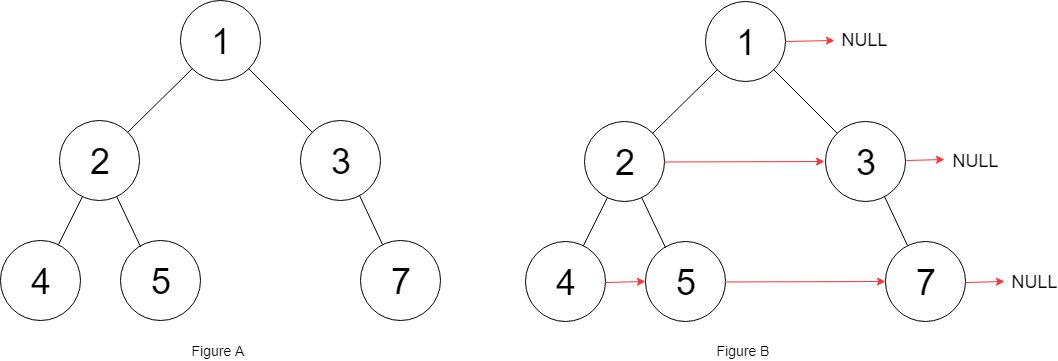LeetCode Top Interview 150
117. Populating Next Right Pointers in Each Node II
Medium
Given a binary tree
struct Node { int val; Node *left; Node *right; Node *next; }
Populate each next pointer to point to its next right node. If there is no next right node, the next pointer should be set to NULL.
Initially, all next pointers are set to NULL.
Example 1:

Input: root = [1,2,3,4,5,null,7]
Output: [1,#,2,3,#,4,5,7,#]
Explanation: Given the above binary tree (Figure A), your function should populate each next pointer to point to its next right node, just like in Figure B. The serialized output is in level order as connected by the next pointers, with ‘#’ signifying the end of each level.
Example 2:
Input: root = []
Output: []
Constraints:
- The number of nodes in the tree is in the range
[0, 6000]. -100 <= Node.val <= 100
Follow-up:
- You may only use constant extra space.
- The recursive approach is fine. You may assume implicit stack space does not count as extra space for this problem.
Solution
from typing import Optional
class Node:
def __init__(self, val=0, left=None, right=None, next=None):
self.val = val
self.left = left
self.right = right
self.next = next
class Solution:
def connect(self, root: Optional[Node]) -> Optional[Node]:
if root is None:
return None
if root.left is None and root.right is None:
return root
if root.left is not None:
if root.right is not None:
root.left.next = root.right
elif root.next is not None:
root.left.next = self._adjacentRightNode(root.next)
if root.right is not None:
root.right.next = self._adjacentRightNode(root.next)
self.connect(root.right)
self.connect(root.left)
return root
def _adjacentRightNode(self, root: Optional[Node]) -> Optional[Node]:
temp = root
while temp is not None:
if temp.left is None and temp.right is None:
temp = temp.next
else:
if temp.left is not None:
return temp.left
if temp.right is not None:
return temp.right
return None

